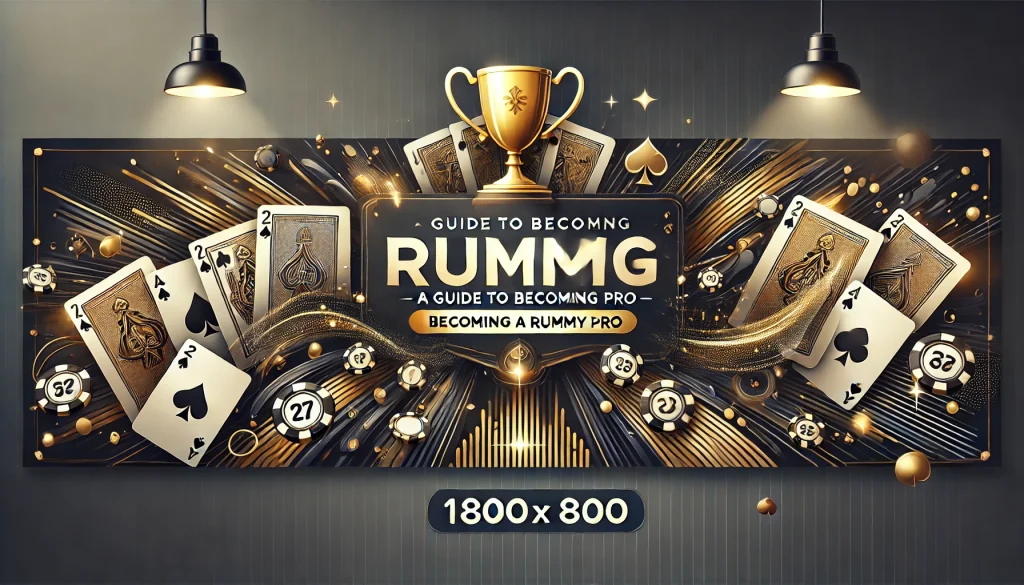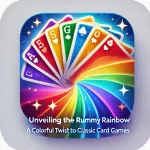Description

Mastering Rummy: A Complete Guide Rummy is a traditional card game that has enthralled players for many years. Both serious competitors & casual players like it because of its unique combination of skill, strategy, and a little bit of luck. Anyone hoping to get better at rummy must grasp the fundamentals.
Rummy is essentially a matching-card game where each player must form sets or runs using the cards that are dealt to them. Three or four cards of the same rank but different suits make up a set, whereas three or more cards of the same suit in a row make up a run. The goal is to combine every card you have into a legitimate combination before your rivals do.
The game can be played with two or more players, and depending on the version—Indian Rummy, Gin Rummy, or Kalooki—the rules can change slightly. A draw pile is created from the remaining cards after each player is dealt a predetermined number of cards. In an attempt to strengthen their hand by creating legal combinations, players alternately draw from the draw or discard piles. When one player successfully melds every card in their deck, the game is over. Points are awarded based on how many unmelded cards are still in the opponents’ hands. Gaining a basic understanding of these elements prepares you to create more complex strategies and enhance your gameplay in general.
The development of a winning strategy is essential for success in rummy. In order to succeed, a player needs to be aware of both their own hand and their opponents’ movements. Making forming sets and runs a priority early in the game is one successful tactic. By doing this, you can lower the quantity of unmelded cards in your hand, lowering the amount of money you could lose if your opponent goes out first.
It can also help you make well-informed decisions about which cards to keep or discard by giving you important information about what your opponents are attempting to collect. Flexibility is a key component of strategy. The cards that are drawn and discarded during the game can cause the dynamics to shift quickly. An inflexible strategy could result in lost chances or needless dangers.
Players should instead maintain their flexibility & modify their plans of action in response to the state of the game. Hold onto cards from a particular suit, for example, to prevent your opponent from making progress if you see that they are gathering cards from that suit. On the other hand, to reduce your risk, think about carefully discarding any extra cards that don’t add to the possible melds in your hand.
Concentrate on Developing Runs. Focusing on producing runs, which frequently offer greater flexibility than sets, is one useful tactic. It may be simpler to add more cards to a run of three cards in a suit than to try to form several sets of cards with different ranks, for instance. You can be more flexible with this method as you draw new cards. identifying possible combinations. Also, you may gain a tactical edge if you are able to identify possible combinations early in the game.
Think about how you can combine cards from the same suit or rank in subsequent draws, for example. You can learn more about your opponents’ hands and improve your decision-making about which cards to keep by keeping an eye on what they are discarding. Learning Combinations to Become a Great Hand. You can make a stronger hand and impede your opponents’ progress at the same time by becoming proficient with these combinations and taking the initiative in your play.
Being able to read your opponents is one of the most important rummy strategies. One can learn a lot about their tactics and goals by paying attention to their actions and card selections. For example, if an opponent routinely removes particular cards from the discard pile, it can mean that they are aiming for a particular run or set. By observing these trends, you can modify your own approach appropriately, either by obstructing their advancement or by predicting their subsequent actions. A player’s emotional state and degree of confidence can also be inferred from their body language & facial expressions.
Anxious or hesitant players might be having trouble with their hand, whereas calm players might be sure of their approach. You can outplay your rivals and make wiser choices throughout the game by improving your ability to read these subtle clues. More seasoned rummy players frequently start using sophisticated strategies that have the power to change the outcome of a match. One of these strategies is called “discarding strategically.”. This entails paying attention to what you decide to throw away as well as which cards you decide to keep.
For instance, you might want to hold onto a card longer than you normally would if it has the potential to assist an opponent in finishing a run or set. This strategy necessitates a thorough comprehension of both your hand and the possible hands of your opponents. Another sophisticated strategy is misdirection or bluffing.
Even though Rummy is largely a skill and strategy game, there are times when it can help to make your opponents uncertain. For example, discarding a seemingly unimportant card that could actually finish an opponent’s meld could make them think they are closer to winning than they are. Utilized sparingly, this psychological component can be especially powerful and adds another level of complexity to the game. Any Rummy player who wants to step up their game must develop their decision-making abilities.
Every turn offers a decision: which card to keep or discard, how to best create melds with the available cards, & whether to draw from the pile or pick up a discarded card. Players who want to make better choices should adopt a methodical approach that takes into account both long-term tactics & short-term gains. When a card completes a set, for instance, it could be tempting to pick it up right away, but it’s important to consider how that decision will impact your hand as a whole & possible future moves. Also, playing with mindfulness can improve your ability to make decisions. Players are able to make clearer and more logical decisions when they concentrate on the present situation of play rather than getting sucked into past errors or worries about the future. Better strategic planning and fewer snap decisions that could endanger your chances of winning are made when you pause to consider the board before acting.
Another essential element of success in rummy is efficient resource management. This entails keeping track of the cards that are in play and how they relate to your strategy in addition to managing your hand. Knowing when to keep some cards and when to let them go is a crucial part of resource management. It might be worthwhile to hold onto your cards until you have a better understanding of the potential of your hand, for example, if you have several that don’t immediately contribute to any melds but might. Also, managing your resources involves monitoring what your rivals are removing and reclaiming from the draw pile.
You can use this information to help you decide which cards you should keep or throw away. Avoid throwing out cards entirely if you observe that your opponent is frequently selecting particular suits or ranks. Players can keep control over their hands and restrict their opponents’ options by managing their resources strategically.
Lastly, the key to winning at rummy is maintaining mental acuity. The game calls for focus, concentration, and fast thinking—skills that are easily weakened by exhaustion or distraction. Players should think about putting cognitive health practices into practice to preserve mental clarity while playing. Frequent brain workouts, like memory games or puzzles, can boost cognitive function and enhance performance at the card table. Maintaining mental acuity during demanding games also requires controlling stress levels.
Players can maintain composure and concentration under pressure by using strategies like mindfulness meditation or deep breathing exercises. Through the development of a robust mental state and the prioritization of cognitive health, players can improve their capacity to make strategic choices and adapt to the constantly shifting dynamics of Rummy. To sum up, learning Rummy entails grasping its foundations while creating sophisticated strategies and refining critical abilities like read opponents & resource management.
Players can greatly increase their chances of winning this age-old card game by concentrating on these areas and keeping their minds sharp while playing. Whether you’re a beginner trying to get the hang of it or an expert hoping to become an expert, these tips will be helpful throughout your Rummy journey.

